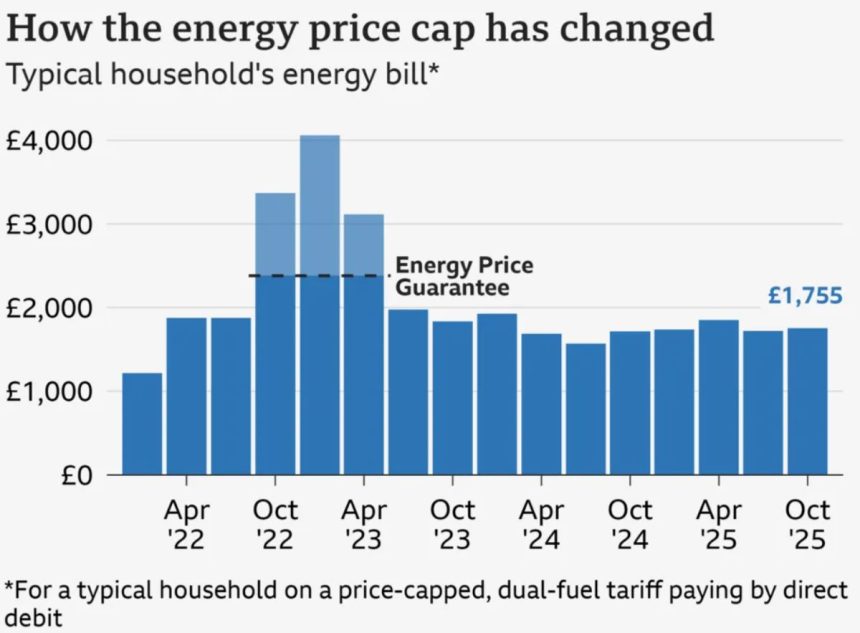Gas and electricity prices will increase by 2% for millions of households in the United Kingdom under the latest cap announced by energy regulator Ofgem.
The change means a typical household will pay about £1,755 a year, £35 more than the current cap. It takes effect in October and will last three months. Campaigners warn this could bring another winter of high energy bills.
Bills will rise by about £2.93 a month for a typical household. Of that, £1.42 will fund the government’s expansion of the Warm Home Discount, which provides money off winter bills for people on certain benefits.
Another £1.23 will cover costs linked to balancing electricity supply, such as switching off wind farms when demand is low or using gas plants when supplies are short. Fixed costs to run the gas network have also increased, adding around 72p a month. Some other costs have dropped slightly.
The cap limits the price per unit of energy, not the total bill, which depends on usage. As a rough guide, households can expect to add £2 for every £100 they currently spend on energy each year.
Ofgem said higher bills this time are partly due to the costs of transmitting energy around the country to meet demand. Support measures, including an extended Warm Home Discount, are also being funded through higher standing charges. These will typically rise by 4% for electricity and 14% for gas, with the latter going from 29p to 34p a day.
Anyone on means-tested benefits will automatically receive the £150 Warm Home Discount. A property-size condition that previously excluded some people has been scrapped.
More than a third of billpayers are now on fixed-price deals, which are unaffected by the cap. Tim Jarvis, Ofgem’s director general of markets, said this showed signs of a “healthier market.”
He admitted households would still feel the impact but noted that some could save money by paying via direct debit rather than standard credit.
Campaigners remain concerned about affordability. Many families are still repaying £4bn in energy debt built up during recent years of high prices. Simon Francis of the End Fuel Poverty Coalition said this meant “another winter of high prices. The average family [is] still paying hundreds of pounds more than they did just a few years ago.”
Community organisations are also stepping in. Parc Primary School in the Rhondda Valley works with the Fuel Bank Foundation to provide energy vouchers for families. “Sometimes you issue a fuel bank voucher and you can see the relief on their face, but it is a short-term [solution],” said Leanne Gough, the school’s family engagement officer. “People are proud, so it takes a lot for them to come to ask. They will do everything they can beforehand.”
The government said expanding the Warm Home Discount would help vulnerable families. Energy Minister Michael Shanks added that more domestic clean energy production was needed to lower costs in the long run.
Energy UK, which represents suppliers, said the discount expansion should be temporary, with longer-term help targeted at those most in need.
The Conservatives argued that bills were rising due to government policy choices rather than wholesale costs. Liberal Democrat leader Ed Davey said “the last thing” families and pensioners needed this winter was higher energy bills.
(BBC)
ALSO READ TOP STORIES FROM NIGERIAN TRIBUNE
WATCH TOP VIDEOS FROM NIGERIAN TRIBUNE TV
- Let’s Talk About SELF-AWARENESS
- Is Your Confidence Mistaken for Pride? Let’s talk about it
- Is Etiquette About Perfection…Or Just Not Being Rude?
- Top Psychologist Reveal 3 Signs You’re Struggling With Imposter Syndrome
- Do You Pick Up Work-Related Calls at Midnight or Never? Let’s Talk About Boundaries







